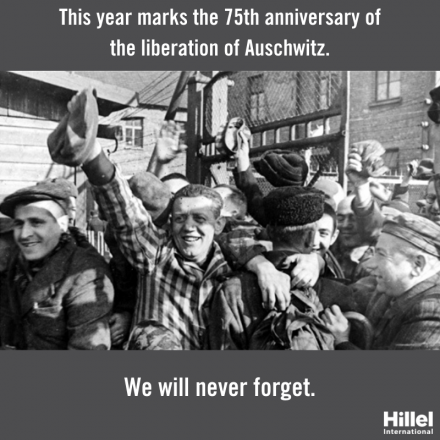This piece by Lawson, assistant chaplain for Jewish life at Elon, challenges readers to remember the past atrocities of the Holocaust so that we can create a better tomorrow.
This week we commemorated the 75th anniversary of the liberation of Auschwitz on International Holocaust Remembrance Day, a day to remember those who died and a day to celebrate our freedom.

Like many rabbis, I look to our Torah for answers and inspiration to today’s questions, problems, concerns, or whatever is weighing on my mind.
This week we are in Parsha Bo and at the climax of Israel’s struggle for freedom. Plague after plague has hurt Egypt, and Pharaoh is finally willing to let some of the Israelites go free, but Moses insists that none of them will go unless all of the Israelites can go. Moses wants freedom for all. Moses says, “We will go with our young and our old, we will go with our sons and our daughters.” In other words, we will not leave anyone behind.
We all know the song. Let my people go. It’s a very famous civil rights song, and a song many of us sing at our Passover Seder, but the next line from the Torah is missing in the song. In the Torah, God says, “Let my people go so they can worship me.” Our freedom as Jews is connected to God. We need to be free to worship God. The founders of the United States created a society based on freedom of religion. We have the freedom to worship as we want. Sadly many in our country don’t understand religions outside of their own. They don’t understand others’ beliefs, and many are fearful of other religions.
As Jews, we are keenly aware of the need to worship freely. As Jews fled from pogroms in Europe, America’s open doors offered shelter and opportunity. And when America kept its doors tightly shut as the Nazi regime grew more deadly, we suffered the agony of those who were left behind. This week I can’t help but remember the 900 Jewish refugees who were on board the ship the St. Louis in 1939. This voyage from Germany to the United States has often been called the “Voyage of the Damned.” The Jewish people who were onboard were seeking to escape Hitler and Nazi Germany. They were refused entrance to the United States because of antisemitism and fear. Fear of the other, and fear of the stranger. The United States should have offered asylum to those fleeing Nazi Germany, but instead were sent back to Europe, and many of them died in the Holocaust.
The Torah says that Moses’ told us, “Remember this day that you went out of Egypt, from a house of bondage.”
The Torah commands us to remember our experience of enslavement and Exodus from Egypt. We are not only commanded to remember but also obligated to direct our memory to interpret the past in a way that will impact our future.
This year, as we study the Torah portion, and remember the victims of the Holocaust, we must commit ourselves to remember and to honor our past so that we can create a better tomorrow.


